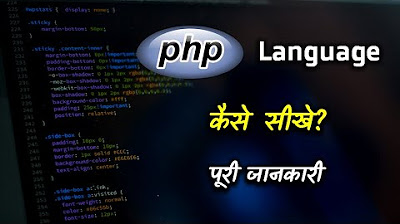1 | Introduction to PHP Programming for Beginners | 2023 | Learn PHP Full Course for Beginners
Summary
TLDRThis PHP course introduction targets beginners, aiming to demystify PHP's basics and its application in web development. The instructor emphasizes a gradual learning curve, starting with foundational PHP concepts before advancing to databases and security. Despite PHP's reputation as a server-side language, it remains dominant in web development, with 78% of websites using it. The course will avoid overwhelming beginners with security details early on, focusing on PHP fundamentals first. It will not cover frameworks like Laravel, prioritizing core PHP knowledge.
Takeaways
- 😀 The course is designed to be beginner-friendly, aiming to make PHP accessible to those new to programming.
- 🎓 PHP, which stands for 'PHP: Hypertext Preprocessor', is a recursive acronym and is primarily used for web development.
- 🌐 PHP is a server-side language, meaning the code runs on the server and is not visible to the client's browser.
- 🔍 Despite myths of PHP being 'dead', it powers over 78% of websites, indicating its dominance in the backend language space.
- 🚀 The course will start with basic PHP concepts and gradually introduce more complex topics like databases and security.
- 🛠 Learning PHP is recommended for anyone looking to specialize in web development, and it's particularly useful for those planning to use WordPress.
- 📚 Documentation for each lesson will be provided to allow for deeper understanding and reference.
- 🔑 The course will initially focus on procedural PHP programming before delving into object-oriented programming.
- 🏗️ Frameworks like Laravel will not be covered in this beginner course to avoid overwhelming new learners with too much information at once.
- 💻 The next step in the course is setting up PHP and installing a local server, a common practice for web developers.
Q & A
What is the main goal of the PHP course mentioned in the script?
-The main goal of the PHP course is to make it beginner-friendly, ensuring that people who have never done PHP before, and might find programming languages intimidating, can get into the course without feeling overwhelmed.
Why might PHP be intimidating for beginners?
-PHP might be intimidating for beginners because it is their first programming language, and it's quite normal to find any programming language intimidating when starting out.
What does PHP stand for and what is its primary use?
-PHP stands for hypertext preprocessor, and it is primarily used for making websites. However, it can also be used for other purposes such as creating desktop applications.
How does PHP differ from HTML, CSS, and JavaScript in terms of where it runs?
-PHP is a server-side language, meaning it runs on the server of a website and not inside the client, which is the browser. In contrast, HTML, CSS, and JavaScript run inside the browser.
What percentage of websites use PHP as their backend language as of 2023?
-As of 2023, more than 78% of websites use PHP as their backend language.
Why do some people consider PHP to be a 'dead' language?
-Some people consider PHP to be a 'dead' language because it is mainly used for web development, whereas other languages like Python can be used for a broader range of applications. However, PHP is still dominant in web development.
Which popular websites and platforms use PHP?
-Popular websites and platforms that use PHP include Facebook, Wikipedia, and WordPress, which is a content management system.
How does the course approach the learning of PHP?
-The course starts with beginner-friendly, procedural PHP programming and gradually becomes more advanced. It also emphasizes the importance of learning theory before moving on to practical examples.
What are the three categories the course divides PHP learning into?
-The course divides PHP learning into three categories: the actual PHP language, learning about databases and how to manipulate them, and security.
Why does the course choose to focus on PHP before diving into security?
-The course focuses on PHP before security to prevent beginners from becoming overwhelmed. Security is a crucial aspect of PHP, but it is introduced later in the course to allow for easier digestion of the material.
Will the course cover any PHP frameworks like Laravel?
-The course will not cover any PHP frameworks like Laravel, as it is designed for beginners and focuses on the basics of PHP. The instructor suggests learning the basics before considering frameworks.
Outlines

This section is available to paid users only. Please upgrade to access this part.
Upgrade NowMindmap

This section is available to paid users only. Please upgrade to access this part.
Upgrade NowKeywords

This section is available to paid users only. Please upgrade to access this part.
Upgrade NowHighlights

This section is available to paid users only. Please upgrade to access this part.
Upgrade NowTranscripts

This section is available to paid users only. Please upgrade to access this part.
Upgrade NowBrowse More Related Video

How to Learn PHP Language With Full Information? – [Hindi] – Quick Support

¿Por qué aprender php en 2024?

PHP в Европе: популярные фреймворки, что спрашивают на собеседованиях, найм PHP-разработчиков

Cara Memanipulasi String pada PHP yang harus dipahami Programmer | #9 - Belajar PHP Dasar

How To Install PHP & What Are Web Servers - PHP 8 Tutorial

Belajar PHP Untuk Pemula - [ 01 ] Sejarah & Perkembangan #NgodingSantai
5.0 / 5 (0 votes)